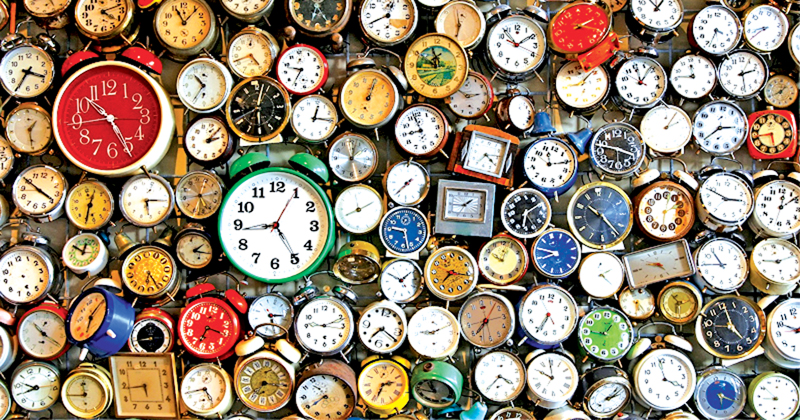The clocks were set to central daylight time on the day I was born. The clock on the microwave next to the stove where my dad was boiling water for pasta read four and some minutes when, from the living room, my mom said, I think we need to go to the hospital. She and my dad got in the car with no bags, none of the Sunday newspapers they’d spent the afternoon reading, and drove east toward Lake Shore Drive, which they’d take south to Michael Reese Hospital.
There are seven clocks in my one-bedroom apartment, two that tick loudly, two that don’t tick, and three digital ones, all set to slightly different times not on purpose but because achieving such widespread accuracy is tough when you’re twisting hands on faces with no numbers and constantly resetting the one digital clock that runs slow because it’s meant to be connected to DC power.
Watch’s hands
I was born on Memorial Day weekend, a Sunday. Chicago was clear and warm, perfect for barbecues. I started wearing a watch as soon as I could tell time. My first watch’s hands had tiny blue faces and names and a story from Swatch: Flik goes quick and Flak stays back. More than two decades later, I worry about time both near and far: how long it’ll take me to walk to my afternoon meeting, how long it’ll take me to fall in love with a yet-unmet man, how long it’ll be before I and this man who doesn’t exist get married. Every time another friend posts a photo on Facebook with her fiancé, her hand on his shoulder so you can see the diamond in iPhone flash, the panic bubbles. My current boyfriend, whom I don’t suspect I’ll marry, tells me I misuse “jealousy” and “envy.”
Sun fell through the windows of the maroon Volkswagen Golf onto my mom, reclined as far as her seat would allow. She was upright enough to see, just before the entrance to the Drive, that traffic was nearly stopped until at least Navy Pier, and upright enough to also see, in the sideview mirror, a canine-unit police cruiser a few cars away. My dad got out to talk to the police. My wife is in labor, he said to the canine-unit man. Follow me closely, the man said. They weaved through the dense traffic all the way south, where they exited, headed briefly west, and reached the hospital, two months early. My mom found the nearest wheelchair and sat in it.
If being late is a sign of self-involvement, then being early should be a sign of selflessness. But it’s not. It too is a kind of self-involvement, a deliberate refusal to measure accurately—and show up on time—because of the egotistical notion that your presence—you being somewhere—is so important that it’s best to err on the side of early.
Wisconsin-cursive
I used to set my watches early, not to trick myself into being on time, as the chronically late may do, but to have the feeling, any time I looked at my wrist, that I was already early.
Taped in my dad’s baby book are a lock of brown hair, the first tooth he lost. In it are Wisconsin-cursive lists of birthday presents and friends and milestones: walking, talking, adding, bike-riding—each with a date, and every year with a set of height and weight numbers, an upward trajectory that ended at 13 years old. How much can time hold? How much can data tell us? I do not know how large 13-year-old boys should be, so my dad’s 63 inches and 103 pounds are unremarkable—or, rather, remarkable not for their content but for their specificity, for the fact that they exist at all. In the hospital my mom told the nurse she hadn’t yet gone to Lamaze classes, she didn’t know what she was doing. The nurse told her to pick something physical to focus her gaze on, so my mom looked out the sixth-floor east-facing window and found in the turquoise wide-waled lake a sailboat to stare at. But then it was late-spring evening, and the sailboat disappeared into the reflective black of night over water, and there was no more looking and there was no more waiting: I was born. - Lit Hub



Add new comment